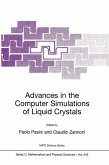The unique behavior of the "liquid state", together with the richness of phenomena that are observed, render liquids particularly interesting for the scientific community. Note that the most important reactions in chemical and biological systems take place in solutions and liquid-like environments. Additionally, liquids are utilized for numerous industrial applications. It is for these reasons that the understanding of their properties at the molecular level is of foremost interest in many fields of science and engineering. What can be said with certainty is that both the experimental and theoretical studies of the liquid state have a long and rich history, so that one might suppose this to be essentially a solved problem. It should be emphasized, however, that although, for more than a century, the overall scientific effort has led to a considerable progress, our understanding of the properties of the liquid systems is still incomplete and there is still more to be explored. Basic reason for this is the "many body" character of the particle interactions in liquids and the lack of long-range order, which introduce in liquid state theory and existing simulation techniques a number of conceptual and technical problems that require specific approaches. Also, many of the elementary processes that take place in liquids, including molecular translational, rotational and vibrational motions (Trans. -Rot. -Vib. coupling), structural relaxation, energy dissipation and especially chemical changes in reactive systems occur at different and/or extremely short timescales.
Dieser Download kann aus rechtlichen Gründen nur mit Rechnungsadresse in A, B, BG, CY, CZ, D, DK, EW, E, FIN, F, GR, HR, H, IRL, I, LT, L, LR, M, NL, PL, P, R, S, SLO, SK ausgeliefert werden.









